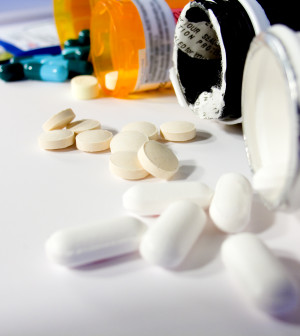- 8 Ways to Increase Dopamine Naturally
- 7 Best Breads for Maintaining Stable Blood Sugar
- Gelatin vs. Collagen: Which is Best for Skin, Nails, and Joints?
- The Long-Term Effects of Daily Turmeric Supplements on Liver Health
- Could Your Grocery Store Meat Be Causing Recurring UTIs?
- Are You Making This Expensive Thermostat Error This Winter?
- Recognizing the Signs of Hypothyroidism
- 10 Strategies to Overcome Insomnia
- Could Artificial Sweeteners Be Aging the Brain Faster?
- Techniques for Soothing Your Nervous System
Key Safety Questions May Linger for FDA-Expedited Drugs


MONDAY, Oct. 28When the U.S. Food and Drug Administration whisks new drugs to market, they do get to patients faster. But they are often not tested as strictly as treatments that get standard reviews, a new study shows.
The research suggests that speed may come at the expense of safety when it comes to testing new medications.
The study, which was published online Oct. 28 in JAMA Internal Medicine, tracked the fates of the 20 new drugs approved by the FDA in 2008.
Eight of the drugs were granted some kind of expedited review. Under expedited reviews, the FDA can waive some of its own rules if regulators decide that new drugs represent key treatment advances or fill unmet needs.
Drugs that were hurried through included treatments for cancer, HIV, pain, abnormal bleeding and a rare disease.
On average, researchers found that expedited drugs made it to market in just over five years. That’s about two and a half years sooner than drugs under standard review.
“Development time and approval of new drugs is really quite rapid, especially for the novel drugs, but a large number of safety questions remain unanswered,” said lead researcher Thomas Moore. He is a senior scientist at the Institute for Safe Medication Practices, a nonprofit patient safety group in Horsham, Pa.
The expedited drugs were tested in an average of 104 patients, while drugs that got routine reviews were tested in an average of 580 patients, the study authors noted.
“I was surprised by how limited some of the testing was,” Moore said.
The FDA also ordered more additional studies for fast-tracked treatments than they did for treatments getting standard reviews.
Post-marketing studies are typically required by regulators to address lingering safety questions.
“There were enough unanswered questions that they required 85 post-market studies,” Moore said. “We’re deferring a lot of our testing until after approval,” he added.
The agency ordered 48 post-marketing studies for the eight expedited drugs compared with 37 for the 12 medications that got standard reviews.
Some of those studies may still be ongoing. The study authors couldn’t find any information on testing timelines for six of the drugs reviewed in 2008. But of the 48 additional studies that were due to be completed by 2013, researchers found that 14 had not been completed or submitted for review on time.
Four years after approval, the study found that many of the drugs had newly discovered safety issues. Five drugs got new or expanded boxed warnings, the most serious kind of caution, added to their labels. Four drugs had additional warnings or precautions added to their packaging.
Moore said he expects that won’t be the end of it. On average, he said, previous studies have shown that it takes about 11 years for the FDA to act on safety issues.
In response, the FDA said the study shows that its expedited drug development programs are working as they are supposed to.
“In situations of serious and life-threatening diseases with unmet medical need, patients and physicians who treat them have told us repeatedly that they are willing to accept greater uncertainty about risk in order to have access to the hope of improved treatment today,” the FDA said in a written statement. “We believe that we have set the bar for the balance between pre-approval testing and early availability of promising new drugs to treat serious and life-threatening diseases in the right place.”
But Moore isn’t so sure.
“I think that having poorly tested drugs that we don’t know enough about is of very limited benefit to anybody,” he said.
More information
For more about how drugs are developed and approved, head to the U.S. Food and Drug Administration.
Source: HealthDay
Copyright © 2026 HealthDay. All rights reserved.










